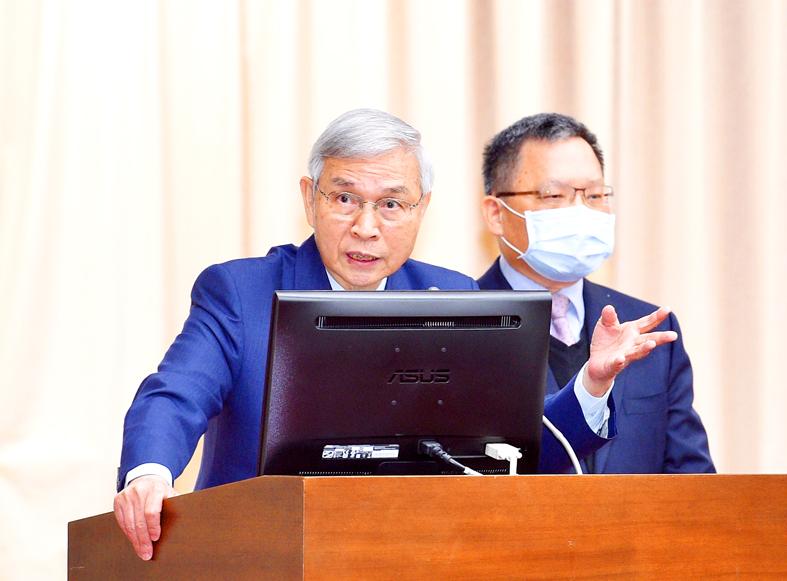The central bank would intervene in the market whenever necessary to help stabilize the New Taiwan dollar, central bank Governor Yang Chin-long (楊金龍) said yesterday, adding that it is concerned Taiwan might be placed on the US watchlist for currency manipulation.
The Control Yuan recently sent letter inquiring about the central bank’s market regulation efforts, Yang told a meeting of the legislature’s Finance Committee on the NT dollar’s appreciation and property price hikes.
“It is the central bank’s top responsibility to stabilize foreign exchanges,” he said.

Photo: Peter Lo, Taipei Times
The central bank has often stepped in toward the end of trading sessions to moderate the NT dollar’s appreciation against the US dollar.
The NT dollar had as of yesterday picked up 3.32 percent against the greenback this year and has on several occasions temporarily surpassed the NT$28.5 defense threshold allegedly set by Yang’s predecessor, Perng Fai-nan (彭淮南).
The central bank has to take action when noticing currency speculation and disorderly fund movements, Yang said.
The governor declined to comment on reports that the NT dollar might next year rise to NT$27.5, but said that global investment banks have mixed views about the US dollar’s outlook.
Taiwan is likely to be added to the US watch list after meeting two criteria: having a trade surplus with the US of at least US$20 billion and a current account surplus of more than 2 percent of GDP, Yang said.
The US normally updates its currency list twice a year, in April and October, but has not released a list so far this year, Yang said, adding that the central bank would try to communicate with the US on the matter.
Yang warned against loose real-estate lending, saying that the government would continue its coordinated efforts to thwart property speculation without affecting real-estate demand.
The endeavor is in the initial stage, but further measures might be implemented if the intended effect is not achieved, Yang said.
In certain sectors of the commercial real-estate market, the price development has been reasonable, as companies are returning production capacity home from China, he said.
Property prices in sectors without such support should be steadier, Yang said, adding that investment accounts for about 14 percent of real-estate financing.
In a best case scenario, the government would achieve its goal of curbing property speculation without putting pressure on local banks, Yang said.

TAKING STOCK: A Taiwanese cookware firm in Vietnam urged customers to assess inventory or place orders early so shipments can reach the US while tariffs are paused Taiwanese businesses in Vietnam are exploring alternatives after the White House imposed a 46 percent import duty on Vietnamese goods, following US President Donald Trump’s announcement of “reciprocal” tariffs on the US’ trading partners. Lo Shih-liang (羅世良), chairman of Brico Industry Co (裕茂工業), a Taiwanese company that manufactures cast iron cookware and stove components in Vietnam, said that more than 40 percent of his business was tied to the US market, describing the constant US policy shifts as an emotional roller coaster. “I work during the day and stay up all night watching the news. I’ve been following US news until 3am

UNCERTAINTY: Innolux activated a stringent supply chain management mechanism, as it did during the COVID-19 pandemic, to ensure optimal inventory levels for customers Flat-panel display makers AUO Corp (友達) and Innolux Corp (群創) yesterday said that about 12 to 20 percent of their display business is at risk of potential US tariffs and that they would relocate production or shipment destinations to mitigate the levies’ effects. US tariffs would have a direct impact of US$200 million on AUO’s revenue, company chairman Paul Peng (彭雙浪) told reporters on the sidelines of the Touch Taiwan trade show in Taipei yesterday. That would make up about 12 percent of the company’s overall revenue. To cope with the tariff uncertainty, AUO plans to allocate its production to manufacturing facilities in

Six years ago, LVMH’s billionaire CEO Bernard Arnault and US President Donald Trump cut the blue ribbon on a factory in rural Texas that would make designer handbags for Louis Vuitton, one of the world’s best-known luxury brands. However, since the high-profile opening, the factory has faced a host of problems limiting production, 11 former Louis Vuitton employees said. The site has consistently ranked among the worst-performing for Louis Vuitton globally, “significantly” underperforming other facilities, said three former Louis Vuitton workers and a senior industry source, who cited internal rankings shared with staff. The plant’s problems — which have not

COLLABORATION: Given Taiwan’s key position in global supply chains, the US firm is discussing strategies with local partners and clients to deal with global uncertainties Advanced Micro Devices Inc (AMD) yesterday said it is meeting with local ecosystem partners, including Taiwan Semiconductor Manufacturing Co (TSMC, 台積電), to discuss strategies, including long-term manufacturing, to navigate uncertainties such as US tariffs, as Taiwan occupies an important position in global supply chains. AMD chief executive officer Lisa Su (蘇姿丰) told reporters that Taiwan is an important part of the chip designer’s ecosystem and she is discussing with partners and customers in Taiwan to forge strong collaborations on different areas during this critical period. AMD has just become the first artificial-intelligence (AI) server chip customer of TSMC to utilize its advanced